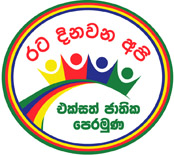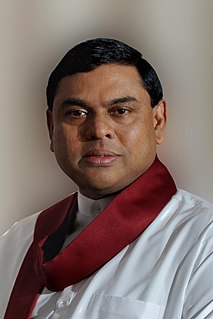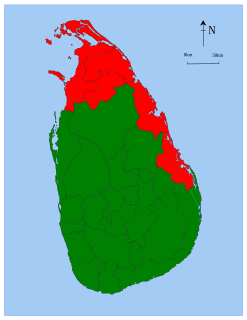
Ranil Wickremesinghe is a Sri Lankan politician and a Member of Parliament from the National List of the United National Party. He is the leader of the United National Party since 1994. He served as Prime Minister of Sri Lanka from 1993 to 1994, 2001 to 2004, 2015 to 2018 and 2018 to 2019 and has served as Leader of the Opposition from 1994 to 2001 and from 2004 to 2015.

The United National Party, often abbreviated as UNP, is a centre-right political party in Sri Lanka. The UNP has served as the country's ruling party, or as part of its governing coalition, for 38 of the country's 69 years of independence. This includes the periods 1947–1956, 1977–1994, 2001–2004, and 2015–2019. The party also controlled the executive presidency from its formation in 1978 until 1994.

Janatha Vimukthi Peramuna is a Marxist–Leninist communist party and a former militant organization in Sri Lanka. The movement was involved in two armed uprisings against the government of Sri Lanka: once in 1971 (SLFP), and another in 1987–89 (UNP). The motive for both uprisings was to establish a socialist state.
The United People's Freedom Alliance was a political alliance in Sri Lanka founded by former Sri Lankan president Chandrika Kumaratunga in 2004 and dissolved by former Sri Lankan President Maithripala Sirisena in 2019.

The Sri Lanka Freedom Party is one of the major and most well known political parties in Sri Lanka. It was founded by S.W.R.D Bandaranaike in 1951 and, since then, has been one of the two largest parties in the Sri Lankan political arena. It first came to power in 1956 and since then has been the predominant party in government on a number of occasions. The party is generally considered as having a democratic socialist or progressive economic agenda and is often associated with nationalist Sinhalese parties. The party follows a Non-Aligned foreign policy but always had close ties to socialist nations. The Sri Lanka Freedom Party is a Second Main constituent party in the Sri Lanka People's Freedom Alliance.

The United National Front(UNF) later the United National Front for Good Governance(UNFGG) is a political alliance in Sri Lanka formed by the United National Party, the alliance currently represents 7 parties including the largest Muslim party Sri Lanka Muslim Congress and the Sinhala Nationalist Jathika Hela Urumaya. The UNF is former governing party in the Parliament of Sri Lanka. A new UNP led alliance, the National Democratic Front (NDF) is in the process of being formed for future elections.

Parliamentary elections were held in Sri Lanka on 16 August 1994. They marked the decisive end of seventeen years of United National Party rule and a revival of Sri Lankan democracy.

Parliamentary elections were held in Ceylon in 1970.

Parliamentary elections were held in Ceylon in 1956. They were a watershed in the country's political history, and was the first elections fought to challenge the ruling United National Party. The former Leader of the House, S.W.R.D. Bandaranaike who was passed over after the death of the first Prime Minister D. S. Senanayake, crossed over to the opposition to form the Sri Lanka Freedom Party to launch his bid for Prime Minister.

The Sri Lanka Eastern Provincial Council elections, 2008 was held on May 10, 2008 to elect members to Sri Lanka’s Eastern Provincial Council. Following the successful completion of local government elections in the Batticaloa District, Sri Lanka’s Elections Department announced on March 14 that the elections for the Eastern Provincial Council were to be held in May, after a lapse of 20 years. It was only the second time direct elections are held to select members for the council, and first time for the Eastern Provincial Council alone, after it was separated from the North-Eastern Provincial Council in 2006.

Basil Rohana Rajapaksa is a Sri Lankan-American politician. He is a member of the Sri Lankan Parliament for national list and the Minister of Finance.

The 1982 Sri Lankan national referendum took place on December 22, 1982, giving the people of Sri Lanka the option to extend the life of parliament by 6 years. It was the first and so far only national referendum to be held in Sri Lanka. The referendum was called for by President J. R. Jayawardene, who had been elected to a fresh six-year term as President in October 1982. With the life of the current parliament due to expire in August 1983, Jayawardene faced the possibility of his ruling United National Party losing its massive supermajority in parliament if regular general elections were held. He therefore proposed a referendum to extend the life of parliament, with its constituents unchanged, thereby permitting the United National Party to maintain its two-thirds parliamentary majority.

Illankai Tamil Arasu Kachchi is a Sri Lankan political party which represents the Sri Lankan Tamil ethnic minority in the country. It was originally founded in 1949 as a breakaway faction of the All Ceylon Tamil Congress (ACTC). In 1972, ITAK merged with the ACTC and Ceylon Workers' Congress (CWC) to form the Tamil United Front, which later changed its name to the Tamil United Liberation Front (TULF). ITAK remained dormant until 2004 when a split in the TULF resulted in ITAK being re-established as an active political party. ITAK is a constituent party of the Tamil National Alliance.
Tamara Kumari Ilangaratne was a Ceylonese politician. She was the third female member to be elected to parliament in Sri Lanka.
Henry Bernard Tenne was a Ceylonese politician.
Don Frank Hettiarachchi was a Ceylonese politician.
Edley Winston Mathew, MBE was a Ceylonese lawyer and politician.

Jayaweera Kuruppu was a Ceylonese politician.
Bernard Soysa was a Sri Lankan politician.
Gamamedaliyanage John Paris Perera was a Ceylonese politician. He was the Deputy Chairman of Committees and Member of Parliament from 1960 to 1977.
This page is based on this
Wikipedia article Text is available under the
CC BY-SA 4.0 license; additional terms may apply.
Images, videos and audio are available under their respective licenses.












